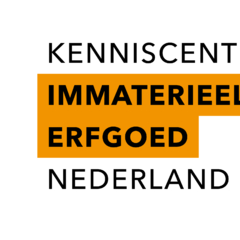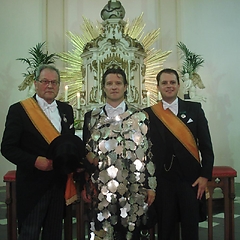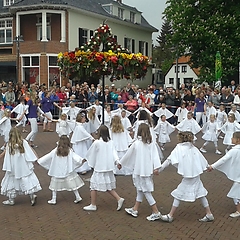On Sunday mornings Gregorian chant is sung by In Honorem Dei during the High Masses in the Basilica of Saint Liduina in Schiedam. On Tuesday evening the choir rehearses the hymns. Also on Sundays, prior to worship, the choir practises.
During the service, the Latin hymns are sung in a fixed order, most of the songs are repeated every week. These hymns can be found in the Graduale Romanum, a chant book for Gregorian singing. During singing the vocal line is read from neumes script. This is a primitive notation without bars. All hymns are rehearsed and performed using this notation. Gregorian chant is a monophonic vocal type of music. There are no bar lines and there is no fixed tempo. It is often performed a cappella, but accompaniment with organ also occurs; In Honorem Dei does both. The choir consists only of men. Gregorian chant is originally a sung prayer, as part of a spiritual exercise.
In Honorem Dei also sings at weddings, funerals, church holidays and occasional ceremonies such as Dark Matins, but not necessarily in the Basilica of Saint Liduina. Funerals, for example, are also sung in the chapel of the Frankeland care home. Chanting also occurs in other churches.
In Honorem Dei has fourteen members in 2019; men of different social classes and denominations who mainly perform in the Basilica of Saint Liduina. The choir members do not have to be religious to join the choir. Musical preference and love for Gregorian singing brings these people together. The choir receives musical direction from a conductor/organist who is made available by the parish council. The conductor is not a member of the choir. He does sing along and is part of the social context.
The choir performs in front of an audience that is present at the services, but also at weddings and funerals. Tourist visitors of the basilica, visitors of the website, online listeners and other church organisations also hear the Gregorian singing of In Honorem Dei.
Gregorian chant has been passed on and kept alive for centuries by various Christian religious communities and monastic orders. Much is unclear about early forms of Gregorian singing and there are many presumptions. It is presumed that the chant dates back to before Christianity and has been influenced by various religious communities.
The Order of Benedictines has made efforts to ensure the survival of Gregorian chant; historical research has been carried out in their monasteries and new collections of vocal works have been produced. The abbey of Solesmes in France is now the pre-eminent knowledge centre for Gregorian chant.
In 1880 the male choir In Honorem Dei was founded on the occasion of the construction of the Singel Church in Schiedam. Gregorian chant was common at the time and therefore naturally became part of the repertoire. For Gregorian chant a separate rehearsal evening was established from March 1882. A special aspect is that, while in the 20th century more and more church choirs switched from Latin to the Dutch language, this choir held on to Latin. As a result, the performance has been maintained to this day. Because of the primitive notation, the sound and the tempo of the performance are not exactly determined. This means that there are regional differences. Gregorian hymns sung in France sounds slightly different from the same songs sung in Schiedam or elsewhere.



